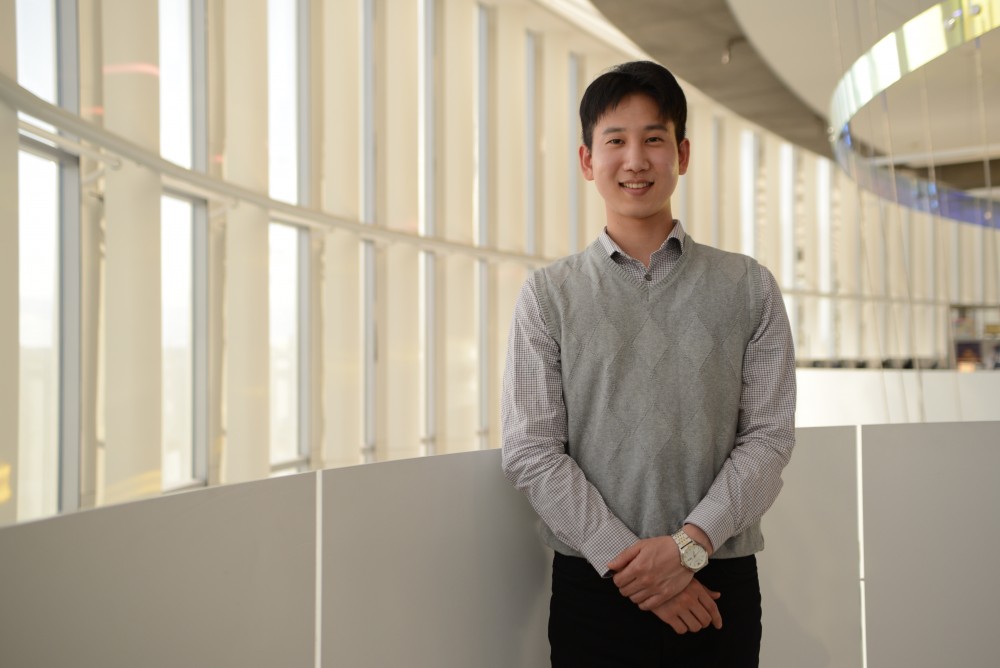Hojae Kim started his South Korean military service in September 2014 after finishing his third year as a University of Minnesota student. Kim said he cried in front of his family before he left for training because he wouldn’t be able to talk to them for a long time.
He recalled a gunnery exercise and throwing grenades during the training. “I don’t want to do it again. It was real,” Kim said.
The University’s Military Leave Support Program hosted a pre-departure workshop last week to provide advice to those who must apply to the Korean military and to advise them about the application process. The workshop hopes to address Korean students’ transitions to and from military life.
Mandatory military service for South Korean males aged 18-28 often interrupts their academic work for around two years. Cultural, social and linguistic differences make readjustment difficult when students return to continue their education, so the school provides resources to ease the process.
After about two years of service as a command post soldier, Kim returned to the University to finish his education. Most of his college friends had now graduated. His first concern upon returning was speaking English.
“If I enlisted [for] two years, I was like, ‘what if I forgot everything,’” he said. “Like how to speak English, even casual conversation, because I cannot speak any English in army service.”
When he returned, he attended a readjustment workshop and many events with native English speakers to improve his communication skills — but he still had to readjust to the culture.
“I had to get used to … [a] whole different culture. Military culture, [is a] hierarchy, [it’s a] strict system,” he said. “The military life … is different from regular society. I already got used to … American culture.”
“We know that leaving the University in the middle of [a] college career could affect student[s] academically,” said Aya Maruyama, an academic and career coach at the Center for Academic Exploration and Planning with an emphasis on international students. “They may take … intro-level courses and prerequisite courses, and then take a break, two years, from the academics … coming back to the upper-level courses … could be a challenge.”
Maruyama said the team hopes to expand the program in the future for international students who must serve mandatory military service for other countries.
Students have no opportunity to use English during military service unless they serve in a special position. They have minimal time to study, which affects their transition back to academic coursework in English.
Students also deal with cultural and social readjustment. If a student takes leave after their second year, most of their friends have graduated by the time they return to campus. Maruyama said losing peer support is difficult for many students.
“Our purpose is to make sure that students are prepared enough to leave and plan ahead and think about what they need to know to prepare to come back and … make a smooth transition to the military services and also back from that to the U of M,” Maruyama said.
Anny Lin, a senior academic adviser in the Carlson School of Management and an undergraduate international student program coordinator, spent three years researching the college experience of Korean international students. She began discussing the pre-departure workshop in 2016 after meeting Jun Seok Lee, a Korean student studying management information systems at Carlson.
In a meeting between Lin and Lee, he discussed difficulties he experienced before and after military service — a concern Lin was not yet familiar with.
“He wanted to tell me his experiences of coming back from military: how lonely he felt, how much difficulty that he had,” Lin said. “Wherever he went on campus, there was no staff, no professor, nobody who knew anything about his military experiences to understand what he went through in the military and … the impact on him coming back.”
Lin, Lee and an International Student Support Services evaluation specialist conducted a research project in fall 2016 looking at the academic impact of military duty for Korean students. The workshop was created based on the results. The first official campuswide pre-departure and readjustment workshop began fall 2016.
“Every year, there are several hundred … international Korean male students who either served or have not served, and [when I met Lee], nobody really knew anything about how academic advisers, career coaches and faculties can work with them [and] help them in this process of transitioning in and out of military service,” Lin said.
Upon return, international students are not eligible for curricular practical training or optional practical training — work authorization programs for international students — until they have been back in the U.S. for an entire year.
Hyun Woo Yang, a second-year statistics student who attended the workshop, said he plans to join the army this summer.
“I have never imagined myself being [in the] military service,” Yang said. “I am concerned, if I waste my time more than one and a half years. I am worried … my graduation might be postponed.”
















